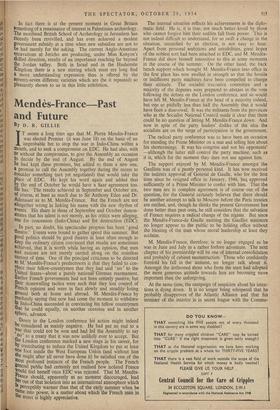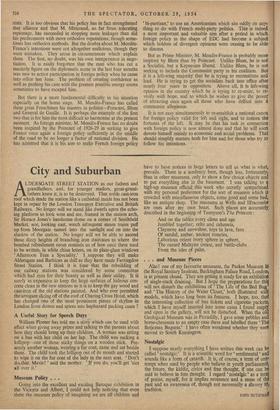Mendes-France Past and Future
BY D. R. GILLIE IT seems a long time ago that M. Pierre Mendes-France was elected Premier (it was June 18) on the basis of an improbable bet to stop the war in Indo-China within a Month, and to seek a compromise on EDC. He had also, with Or without the compromise, to give the Assembly an occasion 110 decide by the end of August. By the end of August e had kept these promises, but added to them a new one, a promise to call the Assembly together' during the recess to Consider something (not yet negotiated) that would take the place of EDC. He kept his word again and added that .yi) the end of October he would have a Saar agreement too. 1-te has. The results achieved in September and October are, of course, at least as much due to Sir Anthony Eden and Dr. Adenauer as to M. Mendes-France. But the French are not altogether wrong in linking his name with the new rhythm of events. His share in those of September and October demon- strates that his talent is not merely, as his critics were alleging, one for concession (Indo-China) and for destruction (EDC).
In part, no doubt, his spectacular progress has been ' good theatre.' Events were bound to gather speed this summer. But good politics should be good theatre at least often enough to Xeep the ordinary citizen convinced that results are sometimes achieved, that it is worth while having an opinion, that men and nations are not merely carried along on the resistless current of time. One of the principal criticisms to be directed et M.' Mendes-France's predecessors is that they failed to con- vince their fellow-countrymen that they had said ' no ' to the United States—about a purely national German rearmament. Lather French governments had not been entirely passive, but their stonewalling tactics were such that they lost control of French opinion and were in fact slowly and steadily losing ftround both at home and abroad. M. Mendes-France by resolutely saying that now had come the moment to withdraw In Indo-China succeeded in convincing his fellow countrymen that he could equally, on another occasion and in another aPhere, advance.
, Down to the London conference his action might indeed be considered as mainly negative. He had put an end to a War that could not be won and had led the Assembly to say to a treaty that it was now unlikely ever to accept. But tole London conference marked a new stage in his career, for c5' contributing to induce the United Kingdom to put at least alle foot inside the West European Union (and without him 'we might after all never have done it) he satisfied one of the Lost profound instincts of the French people. The French general public had certainly not realised how isolated France Would feel herself once EDC was rejected. That M. Mendes- rance should, apparently at no moment diseouraged, lead pier out of that isolation into an international atmosphere which la Perceptibly warmer than that of the early summer when he !,(tIlle into power, is a matter about which the French man in Lae street is highly appreciative. The internal situation reflects his achievements in the diplo- matic field. He is, it is true, not much better, loved by those who cannot forgive him their sudden fall from power. This is not indeed difficult to understand, for so swift a change in the situation, unratified by an election, is not easy to bear. Apart from personal ambitions and sensibilities, great hopes of the noblest sort had been attached to EDC, and M. Mendes- France did show himself insensitive to this at some moments in the course of the summer. On the other hand, the back bench support which brought M. Mendes-France into office in the first place has now swelled in strength so that the hostile or indifferent party machines have been compelled to change their attitude. The socialist executive committee and a majority of the deputies were prepared to abstain in the vote following the debate on the London conference, and so would have left M. Mendes-France at the head of a majority indeed, but one so pitifully less than half the Assembly that it would have been a disavowal. It was the militants from the provinces who at the Socialist National Council made it clear that there could be no question of letting M. Mendes-France down. And now in spite of the party leaders' dislike of the idea the socialists are on the verge of participation in the government.
The radical party conference was to have been an occasion for standing the Prime Minister on a mat and telling him about his shortcomings. It was his-congress .and not his opponents' —although the latter still control the party machine, such as it is, which for the moment they dare not use against him.
The support enjoyed by M. Mendes-France amongst the Gaullists was of a purely personal kind. It has now received the indirect approval of General de Gaulle, who for the first time since he resigned office in January, 1946, hag approved sufficiently of a Prime Minister to confer with him. That the two men are in complete agreement is of course out of the question, for the General certainly believes that there should be another attempt to talk to Moscow before the Paris treaties are ratified, and, though he thinks the present Government has done better than past ones, he still considers that the salvation of France requires a radical change of the regime. But since the Mendes-France-de Gaulle meeting the Gaullist ministers no longer appear to the public to be holding office without the blessing of the man whose moral leadership at least they acclaim.
M. Mendes-France, therefore, is no longer engaged as he was in June and July in a rather forlorn adventure. The next chapter of his premiership will be one of internal consolidation and probably of cabinet reconstruction. Those who confidently foretold his fall in the autumn, no longer talk about it. Amongst the dethroned those who from the start had adopted the more generous attitude towards him are becoming more important than the unforgiving.
At the same time, the campaign of suspicion about his inten- tions is dying down. It is no longer being whispered that ha probably disapproves of the Atlantic Alliance and that his minister of the interior is in secret league with the Commu- nsts. It is too obvious that his policy has in fact strengthened that alliance and that M. Mitterand, so far from tolerating espionage, has succeeded in stopping more leakages than did his predecessors with more orthodox reputations, though some- times less orthodox methods. But the doubts about M. Mendes- France's intentions were not altogether malicious, though they were mistaken. They arose in circumstances which explain them. The first, no doubt, was his own inexperience in nego- tiation. It is easily forgotten that the man who has cut a masterly figure on the diplomatic scene in the last four months was new to active participation in foreign policy when he came into office last June. The problem of creating confidence as well as pushing his case with the greatest possible energy seems sometimes to have escaped him.
But there is a more fundamental difficulty in his situation especially on the home stage. M. Mendes-France has called three great Frenchmen his masters in politics—Poincare, Blum and General de Gaulle. It is perhaps the example of the first two that is for him the most difficult to harmonise at the present moment. As foreign minister, M. Mendes-France has no doubt been inspired by the Poincan.', of 1926-29 in seeking to give France once again a foreign policy sufficiently in the middle of the road to be no longer a factor of national division. He has adthitted that it is his aim to make French foreign policy bi-partisan,' to use an Americanism which sits oddly on any thing to do with French multi-party politics. This is indeed a most important and valuable aim after a period in which foreign policy in the shape of EDC bad become a subject which holders of divergent opinions were ceasing to be able to discuss.
But as Prime Minister, M. Mendes-France is probably more inspired by Blum than by Poincare. Unlike Blum, he is not a Socialist, but a Keynesian liberal. Unlike Blum, he is not seeking to include the Communist party in his coalition. But it is a left-wing majority that he is trying to reconstitute and lead. He is trying to get the socialists back into office after nearly four years in opposition. Above all, it is left-wing opinion in the country which he is trying to re-unite, to re■ vivify with hope, and to which he wishes to give the power of attracting once again all those who have drifted into a communist allegiance.
It is not easy simultaneously to re-establish a national canon for foreign policy valid for left and right, and to restore the fortunes of the left. It may be that his task in connection with foreign policy is now almost done and that he will soon devote himself mainly to economic and social problems. That should simplify matters both for him and for those who try to follow his intentions.



































 Previous page
Previous page